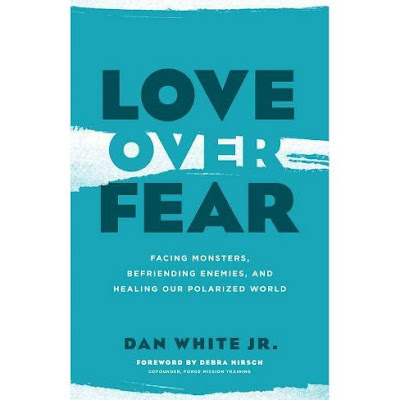 |
| Dan White, Jr./@danwhitejr |
A few paragraphs down
the same page from this call for a new way, White clarifies the challenge that
Jesus gave to his followers to ‘be perfect.’ I would guess that most Christians
would define ‘perfect’ as being without blemish, or untarnished. But White
makes an interesting observation.
“…the Hebrew word (Tamim)
does not carry the same meaning of ‘without error’ in an absolute sense as does
the term ‘perfect’ in English. Tamim means complete or whole. White offers a
few examples of this more accurate meaning: “whole love casts out fear,” or “be
whole as your Father God is whole.”
After offering a more holistic
view of Biblical love, White makes the point about God’s image. “Since humanity
is created in the image of God, a human being is a microcosm of the divine.
Sadly, we often reverse things, and instead of understanding that we are made
in the image of God, we imagine God in our image… we look for a God who fears
what we fear, who hates what we hate, who likes what we like, who affirms what
we affirm.”
Of course, such a
narrow view of God naturally would result in a gathering of like-minded folk,
who would tend to be polarized against anyone who did not happen to hold their
view of God. I love White’s definition of polarization: “Polarization takes people
that have something in common, emphasizes their differences, hardens their
differences into disgust, and slowly turns disgust into blatant hatred for each
other.”
Unfortunately, organized
religion isn’t exempt from this awful dynamic.
White points out that sometimes
polarization is based upon a two-choice view of the world.
“Certainly, seeing the
world through only two choices is convenient and makes our life easier. But
life is more of a spectrum of possible alternatives rather than an option
between two extremes. Human nature, and subsequently Christianity and our cultural
politics, consistently presents false choices. Like saying, ‘You are either
with God or against God.’ Is this true? This type of speech offers no room for
the spectrum of journeying, exploring, and discerning. It certainly offers us security
to think like this, but it is fundamentally not true to human experience nor
does it echo the primary way Jesus related with humans… The very nature
of Christ Himself is beyond either/or.”
There’s also the
element of knowledge itself that can lead to pride, which can, in turn, lead to
polarization and hatred.
White reminds us, “you
don’t see all there is to see from the spot you are standing in. Paradoxically,
the more you see, the more you know, but also the more humbled you become. The
wiser we become, the less wise we feel. This is the wellspring of intellectual
humility – the more you know, the less you realize you know.”
To further drive home
the point that Jesus was the epitome of someone who lived an unpolarized life,
White offers the example of how Jesus chose his disciples. “Jesus gathered
three Zealots who were militant nationalists, a tax collector who favored the
Sadducee party, six fishermen who lived hand-to-mouth and were exploited by
Roman taxation, one member of the Sicarii party, and a wealthy nobleman who was
linked to the Pharisees. This is scandalous!... It’s an understatement to say
that these men would have loathed being in the same room with each other. If it
were not for Jesus holding this space, they’d all naturally slide into the
cultural ditch of mutual hatred for one another… As the disciples faced each
other day after day, ideological and relational differences emerged. Jesus
lives and moves and breathes beyond fear – He invites us to do the same.”
Another ingredient in the mix that results in fear and polarization is the social media information (or misinformation) glut we live in. “Expert Delusion is the misguided belief that you can be an expert because you have access to information… The direct impact of this information-binging is that it erodes our ability to enter into the experience of another. It tricks our egos into believing that we already know because are informed – it gives us bloated brains.”
White goes on to observe
that "[W]e think we can know things about people without dwelling with
people. Being right, without loving well, is not right.”
And this can lead to a
lack of empathy, further fueling the political, religious and racial gulfs
among us. “Without empathy,” White writes, “we are forced to cluster and huddle
with people who are just like us. The moment we interact with someone we are
sniffing out, like bloodhounds, what our differences might be.”
Then White describes
the differences between a culture based on law and one based on relationships.
For the most part, White culture, derived from Western European nations, is one
that places a high value on contracts and laws. Native American culture, by
contrast, existed on oral tradition, storytelling and the value of
relationships.
At this point in Love
Over Fear, White begins to suggest some alternative ways of relating to
those individuals who don’t look, think or worship like us. He calls up the
example of Jesus who always made room at the table for people of all stripes.
“We need renewed faith
that God still wants to heal the world this way [bringing strangers together at
the same table] not because of our ultra-competence, but through our humble
presence.”
He makes the point that
“Christians do not need to seek control in order to make things come out right.
Instead, we are invited to identify the kingdom of God in the midst of our
cracked earthen encounters.”
“Bearing witness to the
kingdom is not about controlling outcomes but awakening imaginations. This is
perhaps the exceptional brilliance of Jesus’ political strategy. He doesn’t
grab you by the shirt and shout in your face; He doesn’t pay for a commercial
that slanders the opposition. He stays at the table and begins to fashion a
world where we no longer see each other as foes. The table stands for a place
of divine availability in the wilderness of isolating, fragmenting, polarizing
American life.”
Finally, White writes
about the ‘aikido of forgiveness.’ Which he describes thusly: “Aikido embodies
this idea that when we stop meeting something with like-force, we can stop
giving it power. We neutralize it, we disrupt it. In aikido, an uke (the person
who receives an attack) absorbs and transforms the incoming aggressive energy…
The goal in aikido is to frustrate the violence of your attacker, eventually
exhausting them, neutralizing them. Forgiveness is not giving yourself over to
the attacker; it’s giving yourself over to another way of being. A way that
disempowers the threat.”
White recognizes that,
viewed from a Western European culture, this could seem like an imminent disaster.
But White’s view is that “to forgive could feel like surrender, a retreat in
the context of a battle. But Jesus offers us forgiveness not as a white flag
but as a weapon… It is not God’s judgment but kindness that leads to
repentance, a change of heart (Rom. 2:4).”
In the conclusion of
Love Over Fear, White states, “The future of the church needs a revolution of
love, a love so scandalous it relaxes in the face of fear to move towards
enemies with affection.”
Of course, this is no small order, but the stakes are too high to keep on giving in to fear.





No comments:
Post a Comment